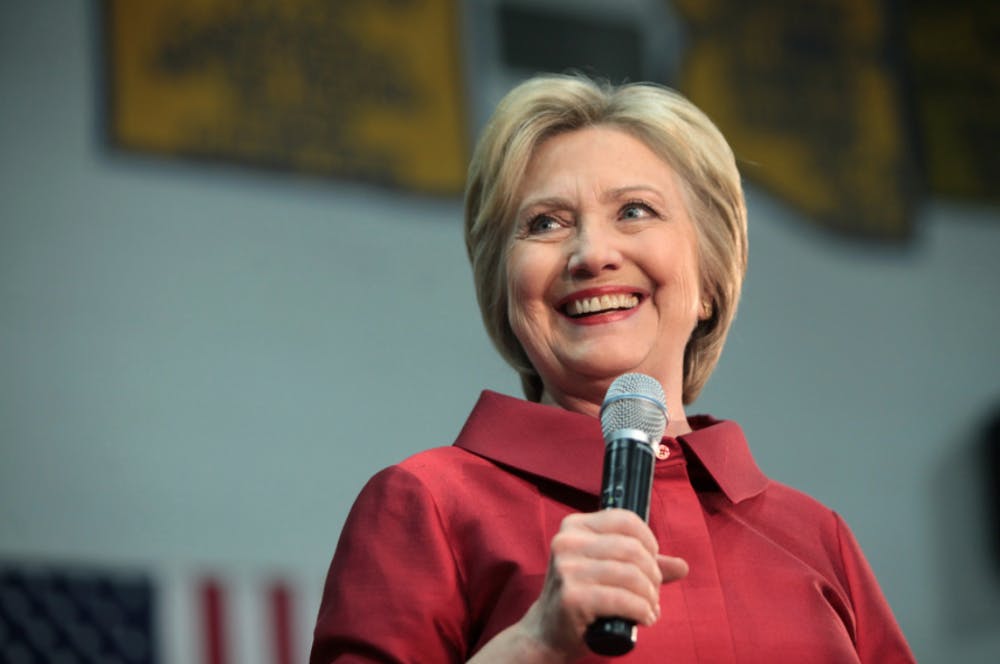The last day of the Democratic National Convention ended with calls for party unity and growth.
Following President Barack Obama’s speech on Wednesday night, which painted an optimistic picture of America’s future and championed Hillary Clinton as his successor, Clinton accepted the Democratic nomination for president of the United States Thursday night. Primetime speakers were Clinton, her daughter Chelsea Clinton and Ohio Sen. Sherrod Brown. Celebrity appearances included Carole King, Chloe Grace Moretz and Katy Perry.
"America needs every one of us to lend our energy, our talents, our ambition to making our nation better and stronger," Clinton said. "I believe that with all my heart. That's why 'Stronger Together' is not just a lesson from our history. It's not just a slogan for our campaign. It's a guiding principle for the country we've always been and the future we're going to build."
Reverend William Barber, director of the North Carolina chapter of National Association for the Advancement of Colored People, also spoke about the fight for voting rights and social justice.
"Some issues are not left versus right or liberal versus conservative, they are right versus wrong," Barber said.
Earlier that morning, the North Carolina delegation heard from Connecticut Governor Dan Malloy and Charlotte Mayor Jennifer Roberts at breakfast. Malloy, who is also the chair of Democratic Governors Association, advocated for Attorney General Roy Cooper’s campaign for Governor of North Carolina against incumbent Republican Governor Pat McCrory, citing House Bill 2’s negative impact on the state’s economy and image.
“We care about other human beings,” Malloy said. “We would never want to take away their rights. We have to stand up for the people we love.”
The North Carolina delegation contains 49 delegates who voted for Sen. Bernie Sanders and 71 delegates who voted for Clinton. Despite demonstrations and dissent on the floor of the convention and outside in Philadelphia, Sanders superdelegate Jake Quinn said that the speakers of the convention, particularly President Obama and Vice President Joe Biden, have been effective in unifying the party.
“I have been inspired by the speeches so far,” Quinn said. “Bernie Sanders supporters across the country heard great advice from the Vice President and President. That’s how you build party: respect. It was in abundance [Wednesday night] and that’s what makes me so excited because that tells me my party has a future."
Quinn also expressed that a majority of the North Carolina Bernie delegates had united for Clinton.
“Bernie Sanders supporters in this delegation are Democrats, and they are going to support our ticket top to bottom,” Quinn said. “It makes sense because they listened the past three days. They’ve gotten the message. They understand how important it is to the nation and to every candidate that is down ballot for them to get out there and work for Democrats.”
Quinn noted that the North Carolina Democratic Party’s ability to unify was also in party due to Chair Patsy Keever, Trinity ’69, who he said did not favor “one faction over another."
Keever added that a key to the party’s success is the Clinton campaign’s efforts to coordinate with the party and Democratic candidates at the local and state level, which she noted was not part of Obama’s campaign.
“[The Clinton campaign] is about building the Democratic party,” Keever said. “That’s what is so nice about Hillary’s campaign is they have a statewide strategy, a 50-state strategy. So, I think what Hillary’s doing absolutely will [help the local candidates], whether they identify specifically or not. Having organizers and field people out there is going to help every campaign and we need every campaign.”
The polling aggregation website FiveThirtyEight shows Clinton with a one point bump in the polls. The convention has also increased Clinton’s chances of winning in key battleground states Florida, Iowa, North Carolina, Ohio and Pennsylvania.
As of July 29, the last day of convention, Clinton’s chances to win Florida is 49.3 percent, Iowa is 50.9 percent, North Carolina is 41 percent, Ohio is 49 percent and Pennsylvania is 62.6 percent.
Overall, Clinton’s chance of winning the presidency rose by two percent—now at 61.6 percent, according to FiveThirtyEight.
Get The Chronicle straight to your inbox
Signup for our weekly newsletter. Cancel at any time.
Class of 2019
Editor-in-chief 2017-18,
Local and national news department head 2016-17
Born in Hyderabad, India, Likhitha Butchireddygari moved to Baltimore at a young age. She is pursuing a Program II major entitled "Digital Democracy and Data" about the future of the American democracy.

